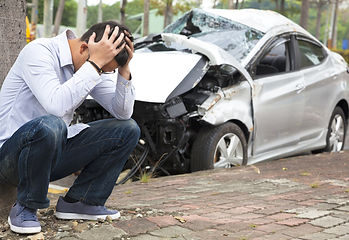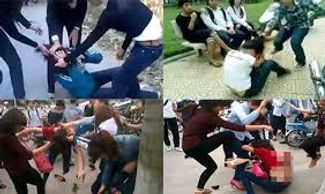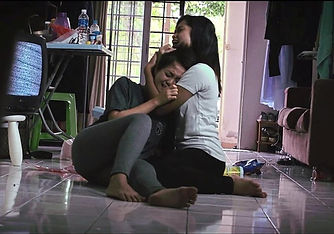

Shock
What is considered a Shock?
Early childhood shock generally refers to the shock experiences that occur to children aged 0-6. These shocks can be the result of intentional violence, such as child physical or sexual abuse or divorce or domestic violence, or the result of natural disaster, accidents, or war...
For adults shock is an emotional response to a terrible event like an accident, divorce, separation, rape or natural disaster... Immediately after the event, shock and denial are typical. Longer term reactions include unpredictable emotions, flashbacks, strained relationships and even physical symptoms like headaches or nausea...


Sexual Abuse or Assault
Sexual abuse or assault includes unwanted or coercive sexual contact, exposure to age-inappropriate sexual material or environments, and sexual exploitation.
Physical Abuse or Assault
Physical abuse or assault is defined as the actual or attempted infliction of physical pain (with or without the use of an object or weapon), including the use of severe corporeal punishment. Federal law defines child abuse as any act, or failure to act, which results in death, serious physical or emotional harm, sexual abuse, or exploitation of a child.
Emotional Abuse or Emotional Maltreatment
Emotional abuse or maltreatment are considered acts of commission (other than physical or sexual abuse) against an individual. These kinds of acts, which include verbal abuse, emotional abuse, and excessive demands or expectations, acts of omission against a minor such as emotional neglect or intentional social deprivation...











Neglect
Neglect is the most common form of abuse reported to child welfare authorities. However, it does not occur only with children. It can also happen when a primary caregiver fails to give an adult the care they need, even though the caregiver can afford to, or has the help to do so. Neglect also includes the failure to provide an individual with basic needs such as food, clothing, or shelter... Neglect also includes exposing someone to dangerous environments, abandoning a person, or expelling them from home.
Serious Accident, Illness, or Medical Procedure
Trauma can occur when a person experiences an unintentional injury or accident, a physical illness, or medical procedures that are extremely painful and/or life threatening.
Victim or Witness to Domestic Violence
According to DOJ’s Office on Violence Against Women, domestic violence is defined as: “a pattern of abusive behavior in any relationship that is used by one partner to gain or maintain power and control over another intimate partner. Domestic violence can be physical, sexual, emotional, economic, or emotional actions or threats of actions that influence another person. This includes any behaviors that intimidate, manipulate, humiliate, isolate, frighten, terrorize, coerce, threaten, blame, hurt, injure, or wound someone.” Domestic violence includes violence and abuse by current or former intimate partners, parents, children, siblings, and other relatives.
Victim or Witness to Community Violence
Extreme violence in the community, including exposure to gang-related violence, interracial violence, police and citizen altercations, and other forms of destructive individual and group violence is a recognized form of shock.
Historical Shocking Event
Historical shock is a form of shock that impacts entire communities. It refers to the cumulative emotional and emotional wounding, as a result of group shocking experiences, that is transmitted across generations within a community. Unresolved grief and anger often accompany this shock and contribute to physical and behavioral health disorders. This type of trauma is often associated with racial and ethnic population groups in the United States who have suffered major intergenerational losses and assaults on their culture and well-being.
School Violence
School violence is described as violence that occurs in a school setting and includes, but is not limited to, school shootings, bullying, interpersonal violence among classmates, and student suicide. Youth violence is a serious problem that can have lasting harmful effects on victims and their families, friends, and communities
Bullying
Bullying is unwanted, aggressive behavior among school-aged children that involves a real or perceived power imbalance. The behavior is repeated, or has the potential to be repeated, over time. Both kids who are bullied and who bully others may experience serious, lasting problems. Shock can be a consequence of bullying, which can lead to mental health issues, substance use, and suicide, particularly if there is a prior history of deep sadness or delinquency.
Natural or Manmade Disasters
Trauma can result from a major accident or disaster that is an unintentional result of a man made or natural event... Disasters can occur naturally (such as tornadoes, hurricanes, earthquakes, floods, wildfires, mudslides, or drought) or be human-caused (such as mass shootings, chemical spills, or terrorist attacks).
Forced Displacement
Forced displacement is a shocking event that occurs when people face political persecution and are forced to relocate to a new home (as an immigrant or through political asylum) or become a refugee.
War, Terrorism, or Political Violence
Exposure to acts of war-, terrorism-, or political-related violence such as bombing, shooting, and looting can cause shock in an individual.
Military shocking experiences
Military shocking experiences refers to both the impact of deployment and shock-related stress on people who are deployed and their families. Significant numbers of returning service men and women experience emotional and/or substance use behaviors associated with military shocking experiences and/or military sexual assault or abuse experiences.
Victim or Witness to Extreme Personal or Interpersonal Violence
This type of trauma includes extreme violence by or between individuals including exposure to homicide, suicide, and other extreme events.
Shocking Grief or Separation
Shocking grief and/or separation may include the death of a parent, primary caretaker, or sibling; abrupt and/or unexpected, accidental, or premature death or homicide of a close friend, family member, or other close relative; abrupt, unexplained and/or indefinite separation from a parent, primary caretaker, or sibling due to uncontrollable circumstances.
Hypnosis and the Release of Shocking Experiences
In the process of helping and release of past or present shocking experiences, the three most important elements are:
-
The energetic somatic release of the painful emotions, which in turn releases the shock and body armoring embedded in the body’s musculature and nervous system.
-
Containment of the process and of the client’s energy. The hypnotic state is induced, managed, and terminated all in an orderly way. We help the emotions through the extinguishing process. We help them to create a safe resource state with anchors that they can always return to and use as a refuge from overwhelm. Ego strengthening is begun before the therapeutic part of the session, and continued throughout with corrective experiences of empowerment. There is an agreed upon signal to use if they wish to interrupt the process or take an intermission, example: “1, 2, 3, Stop”
-
The corrective experience. They abreast feelings bringing in the adult to express for the child what the child could not express at the time of the trauma, thus overcoming early inhibitions. Their experience is legitimized. They learn to attribute the abusive behavior to the abuser, not accepting blame themselves, and to discriminate between self-identity and interjected qualities taken on from others. They reconnect memories and emotions to events, giving meaning to past events that were experienced as bewildering.
and there is many more techniques...
Don't let the shock affect all your life...
Make your decision RIGHT NOW...
Please know that we can help you with all issues mentioned here and in the tabs and many more...
Your sessions are completely confidential and you are guaranteed professional, experienced and trusted help.
For more information and an appointment, feel free to Contact Us

Our sessions
Our Hypnotist Charbel Ramia is an Emergency Hypnotist and hypnosis Instructor too: He trains doctors, police officers, nurses, firefighters, and paramedics, to treat people who have experienced traumatic events such as car accidents, earthquakes, terrorist attacks, rape, etc..., he can help you to have less pain and a better life.
1- Your hypnosis session:
-
Questionnaire and tests: it is the beginning of the collaboration. Your therapist will help you determine goals that reflect your motivations and respect your integrity.
-
Sessions of hypnosis: your hypnotist will offer you the hypnotic induction that suits you best and the most adapted work.
-
Awakening: a debriefing of the work done and a check-up to make sure everything is going well.
2- The duration of the hypnosis sessions.
The duration of the first session of hypnosis is 1 hour and half (90 minutes). the other sessions are about 45 minutes to 1 hour for each session.
In most cases 1 to 5 sessions are usually enough to obtain convincing results. Sometimes it is necessary to consider more sessions.






